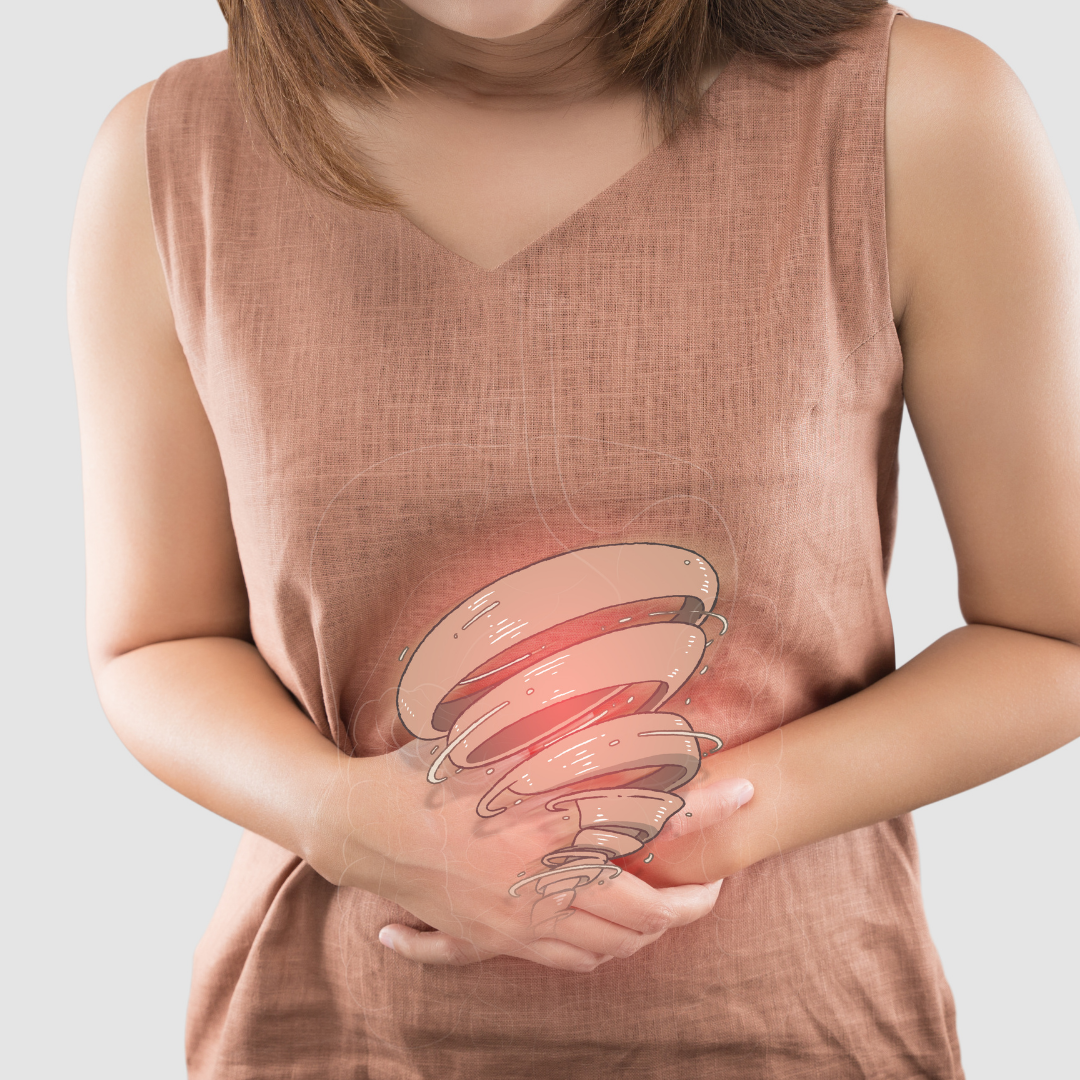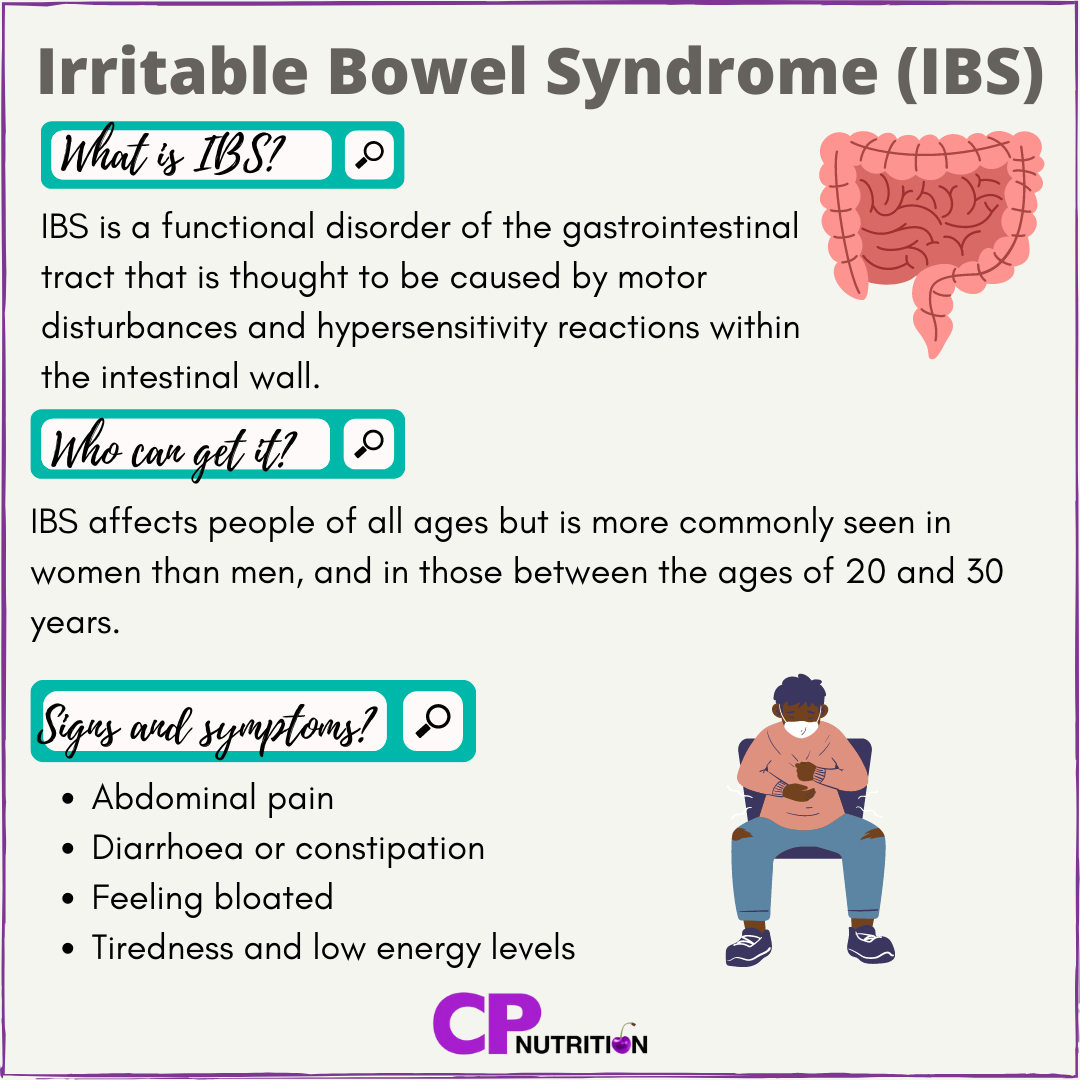Irritable Bowel Syndrome (IBS): The Basics
Do you, or someone you know, suffer from irritable bowel syndrome (IBS)? As one of the most common functional gastrointestinal disorders in the world, it is not too surprising if you do, as IBS affects around 11% of the population globally (1), and it is thought that even more are living with the condition without a diagnosis (2). IBS most often affects those between the ages of 20 and 30 years, and is twice as common in women as in men (3).
What is IBS?
IBS is characterised by either chronic or recurring abdominal pain in combination with a change in bowel habits, such as constipation, diarrhoea or a mixture of both, with the abdominal pain often going away once the bowels have been emptied (4). IBS tends to be a chronic condition which can have a really big impact on quality of life.
It is important to rule out other gut disorders before you are given a diagnosis of IBS, including conditions like coeliac disease, inflammatory bowel disease (IBD), or bowel cancer - all of which affect the structure of the gut. Whilst we don’t completely understand what causes IBS, we do know that the structure of the intestine is not damaged or abnormal, hence it is referred to as a functional gut disorder.
Signs and symptoms of IBS
IBS is a syndrome (a collection of symptoms), and so a person with IBS will have symptoms that are specific to them and will not always experience the same symptoms as another person with IBS.
Some of the most common symptoms of IBS are (5, 6):
Lower abdominal pain (usually relieved by emptying the bowels)
Change in bowel habits including changes in stool (poo) form and frequency
Passing mucus when you poop
Feeling bloated and having visible abdominal distension (enlargement of the stomach)
Constipation or diarrhoea or fluctuations between both
Feeling of incomplete emptying of the bowels
However, not all the symptoms of IBS are related to the gut, there are often more generic ones too (5), such as:
Fatigue and low energy levels
Poor social functioning
Bodily pain
An impact on emotional wellbeing
As you can see, IBS can therefore significantly impact our health-related quality of life.
But what causes the symptoms of IBS if it’s not damage to the gut?
Although there are many possible factors and we don’t know for sure what causes each personl’s IBS symptoms, we do know that generally those with IBS:
Tend to have what is called visceral hypersensitivity - this basically means they have really sensitive nerve endings in the gut which respond to normal stimuli, such as food in the gut, by sending signals to the brain to say there is pressure in the gut, which can lead to abdominal pain.
May have gastrointestinal motor disturbances, meaning digested food can move too quickly or too slowly through the gastrointestinal tract, which can lead to diarrhoea or constipation (5).
Stress
Family history of IBS
Other possible triggers for IBS are thought to be due to gut-brain interactions, poor absorption of carbohydrates and food sensitivity (5).
Who can develop IBS?
IBS can affect both children and adults, however, it is more commonly seen in women than in men and less common in people above the age of 50 (7). Other possible factors which mean someone may be more likely to develop IBS include (5):
Having an infection of the intestine which can lead to low-grade inflammation
Psychological factors such as stress which can worsen the symptoms of IBS
Genetic predisposition such as having a family member with IBS
Managing IBS with lifestyle
IBS can be managed by treating the symptoms an individual is experiencing with both dietary and lifestyle advice. This advice should always be tailored to the specific symptoms experienced. Initial advice can include (8, 9):
Management of stress/anxiety that can worsen symptoms. May be beneficial to try relaxation tapes, yoga or massages
Consuming regular meals and maintaining a balanced diet
Keeping a food and symptom diary to monitor changes
Fibre intake may be adjusted to match symptoms. This can be reduced if experiencing diarrhoea or increased if experiencing constipation
Consider the use of trialling over-the-counter probiotic supplements to aid gastrointestinal symptoms
Consume plenty of fluids
Physical activity such as walking or cycling is encouraged
A healthcare professional such as a dietitian, should always be consulted and can tailor advice for an individual’s symptom management. If symptoms remain following the lifestyle changes, pharmacological therapies such for constipation, diarrhoea and abdominal pain may be needed.
This blog post was written by student dietitian Rianne Kaur, and reviewed and edited by Claire Pettitt PhD RD.
References
Chatila, R., Merhi, M., Hariri, E. et al. Irritable bowel syndrome: prevalence, risk factors in an adult Lebanese population. BMC Gastroenterol 17, 137
Sayuk, G., Wolf, R. and Chang, L., 2017. Comparison of Symptoms, Healthcare Utilization, and Treatment in Diagnosed and Undiagnosed Individuals With Diarrhea-Predominant Irritable Bowel Syndrome. American Journal of Gastroenterology, 112(6), pp.892-899.
NICE, 2017. Introduction | Irritable bowel syndrome in adults: diagnosis and management | Guidance | NICE. [online] Nice.org.uk. Available at: <https://www.nice.org.uk/guidance/cg61/chapter/introduction#:~:text=IBS%20most%20often%20affects%20people,of%20IBS%20in%20older%20people> [Accessed 20 January 2022].
Holtmann, G., Ford, A. and Talley, N., 2016. Pathophysiology of irritable bowel syndrome. The Lancet Gastroenterology & Hepatology, 1(2), pp.133-146.
Saha, L., 2014. Irritable bowel syndrome: Pathogenesis, diagnosis, treatment, and evidence-based medicine. World Journal of Gastroenterology, 20(22), p.6759.
Sood, R., Law, G. and Ford, A., 2014. Diagnosis of IBS: symptoms, symptom-based criteria, biomarkers or 'psychomarkers'?. Nature Reviews Gastroenterology & Hepatology, 11(11), pp.683-691.
IFFGD, 2022. Facts About IBS - About IBS. [online] About IBS. Available at: <https://aboutibs.org/what-is-ibs/facts-about-ibs/#:~:text=IBS%20affects%20people%20of%20all,older%20adults%20suffer%20as%20well> [Accessed 20 January 2022].
BDA, 2022. Irritable Bowel Syndrome Food Fact Sheet. [online] Bda.uk.com. Available at: <https://www.bda.uk.com/resource/irritable-bowel-syndrome-diet.html> [Accessed 20 January 2022].
NICE, 2021. Irritable bowel syndrome. [online] Cks.nice.org.uk. Available at: <https://cks.nice.org.uk/topics/irritable-bowel-syndrome/> [Accessed 20 January 2022].



